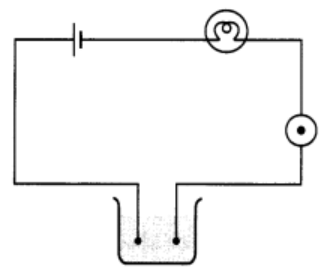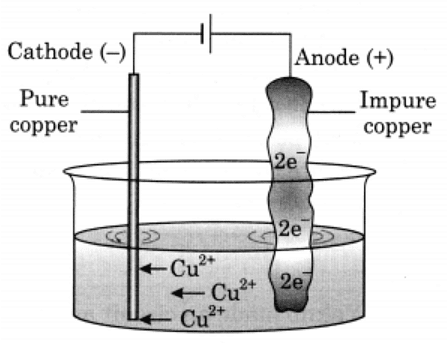Class 8 Science Chapter 11 HOTS Questions - Chemical Effects of Electric Current
Question 1. Why electric fires are extinguished with either using CO2 extinguisher or mud but not water?
Answer: As water is a good conductor of electricity so it can cause electrocution. Hence, water is avoided in extinguishing electric fires.
Question 2. Why do you think electroplated jewelleries are in demand?
Answer: Electroplated jewelleries are in demand because firstly, they are as shiny and attractive as real jewelleries. They are light-weighted and cost effective. Secondly, one feels free to wear it because of the growing problem of snatching and theft.
Question 3. Do distilled water conduct electricity? What will happen if we add sugar to it and then salt to it? Explain.
Answer: No, distilled water do not conduct electricity. If we add sugar to distilled water, then also it will not conduct electricity because sugar do not dissociates into ions. But on adding salt, it will conduct electricity because aqueous salt solution is a good conductor of electricity.
Question 4. Suppose you want to deposit silver on an iron spoon using silver nitrate as electrolyte. Which terminal of the battery you should connect the spoon? What material should the other electrode be made of?
Answer: Silver ion is positively charge, so the spoon must be connected to negative terminal to deposit silver on it. The other electrode should be made of silver.
Question 5. Why potato turns green on passing current? Around which terminal greenish patch is observed?
Answer: Potato turns green due to chemical effect of current. Around positive terminal greenish patch in potato is observed.
Q6. Yakub made an circuit as shown in the figure. He observed that the bulb did not glow but on bringing a compass needle near it shows deflection. He was quite confused that if current is flowing through the circuit then why the bulb is not glowing. Meanwhile his friend Sourav arrived and suggested him to add one more cell in the circuit. The bulb, then started glowing.
(a) Define a circuit.
(b) What does the deflection of a compass needle shows?
(c) Why the bulb did not glow in the first case but glow in the second case?
(d) What value of Sourav is shown here?
Ans: (a) Circuit is a closed path through which an electric current flows.
(b) Deflection of compass needle shows that the current is flowing in the circuit. It is magnetic effect of current.
(c) The current flowing through the circuit in first case was too low to make the bulb glow but on adding a cell in the second case makes the bulb glow.
(d) Sourav is an intelligent, helpful, analytical and with scientific aptitude.
Q7: While demonstrating an experiment to show whether the given liquid conduct electricity or not to class VIII students, teacher reminded everybody that one should not conduct experiment with the electric supply from the mains or a generator or an inverter. They should use electric cells for the activity.
(a) Do liquids conduct electricity?
(b) Why we should not use electric source from mains generator or an inverter?
(c) What values do we get from this?
Ans: (a) Yes, liquids which are solutions of acids, bases and salts conduct electricity. Other liquids such as oil, alcohol, sugar solution and pure water do not conduct electricity.
(b) Current flowing from mains, generator or an inverter is very large. So to avoid the chances of elec-trocution and short-circuit we must use cells for experiments.
(c) We get awareness of not using main electric supply and precaution to be followed while doing experiment.
Q8: On what factors thickness of the electroplated items depend?
Ans: Thickness of electroplated items depend upon:
- The strength of the current passing through the circuit.
- The concentration of the metal ion in the solution.
- The duration of the time the article has been in the solution.
Q9: With the help of a suitable diagram, explain electrolytic refining of copper.
Ans: To purify copper, a thin plate of pure copper and a thick rod of impure copper are used as electrodes in the acidified solution of CuS04. Pure copper is used as cathode and impure copper is used as anode. When electric current is passed through the copper sulphate solution, copper sulphate dissociates into copper and sulphate. The free copper gets drawn to the electrode connected to the negative terminal of the battery and gets deposited on it. From impure copper electrode, an equal amount of copper gets dissolved in the solution. Thus, the loss of copper from solution is restored and the process continues. The impurities are left behind at anode.
Q10: Does water conduct electricity? Show with the help of an activity.
Ans:
Normal or ordinary water is a good conductor of electricity while distilled water is a bad conductor or insulator. Ordinary water may contain small amount of mineral salts dissolved in it naturally; on the other hand, distilled water is free of salts. The following activity shows this fact: About 50 mL of distilled water is taken in a clean and dry beaker. When the tester is dipped into the distilled water, the bulb does not glow which shows that distilled water is a bad conductor of electricity. But when a small amount of common salt is dissolved in distilled water and again tested the bulb glows which shows that distilled water when mixed with salts conduct electricity.
|
92 videos|296 docs|44 tests
|





















